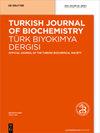Protective effects of α-lipoic acid and L-carnitine in liver ischemia/reperfusion injury.
IF 0.7
4区 生物学
Q4 BIOCHEMISTRY & MOLECULAR BIOLOGY
Turkish Journal of Biochemistry-turk Biyokimya Dergisi
Pub Date : 2014-01-01
DOI:10.5505/TJB.2014.02525
引用次数: 2
Abstract
Objective: Oxidative stress plays an important role in the pathogenesis of liver ischemia/ reperfusion injury. Thus, antioxidant treatment can be protective against to liver ischemia/reperfusion injury. The aim of this study to investigate the effects of α-lipoic acid and L-carnitine on liver total oxidant status, lipid peroxidation, protein oxidation, neutrophil infiltration and hepatic necrosis in liver ischemia/reperfusion model. Methods: Wistar albino male rats were divided into four groups randomly: Sham (n=7), ischemia/reperfusion (n=7), α-lipoic acid (n=8) and L-carnitine (n=8). α-Lipoic acid (100 mg/kg) and L-carnitine (100 mg/kg) were given intraperitoneally to α-lipoic acid group 15 minutes before and to L-carnitine group 30 minutes before ischemia/reperfusion protocol, respectively. To induce hepatic ischemia/reperfusion injury, ischemia (60 minutes) and reperfusion (30 minutes) were applied to all groups except sham group. Total oxidant status, malondialdehyde, advanced oxidation protein products and myeloperoxidase levels were measured in ischemic lobes of liver tissues. Hepatic necrosis was scored microscopically. Results: There was no significant change in myeloperoxidase levels as an indicator of neutrophil infiltration after reperfusion procedure. Both L-carnitine and α-lipoic acid caused a significant decrease in hepatic necrosis. While L-carnitine prevents an increase in total oxidant status, lipid peroxidation and protein oxidation, α-lipoic acid prevents only an increase in lipid peroxidation of the liver in hepatic ischemia/reperfusion injury. Conclusion: As a result; we can report that L-carnitine and α-lipoic acid have protective effects against to hepatic ischemia/reperfusion injury.α-硫辛酸和左旋肉碱对肝脏缺血再灌注损伤的保护作用。
目的:氧化应激在肝脏缺血再灌注损伤的发病机制中起重要作用。因此,抗氧化治疗对肝脏缺血再灌注损伤具有保护作用。本研究旨在探讨α-硫辛酸和左旋肉碱对肝缺血再灌注模型大鼠肝脏总氧化状态、脂质过氧化、蛋白质氧化、中性粒细胞浸润和肝坏死的影响。方法:Wistar白化雄性大鼠随机分为4组:假手术组(n=7)、缺血再灌注组(n=7)、α-硫辛酸组(n=8)、左旋肉碱组(n=8)。α-硫辛酸组在缺血再灌注前15分钟腹腔注射α-硫辛酸(100 mg/kg),左旋肉碱组在缺血再灌注前30分钟腹腔注射左旋肉碱(100 mg/kg)。除假手术组外,其余各组均给予缺血(60分钟)和再灌注(30分钟)诱导肝缺血/再灌注损伤。测定肝组织缺血叶的总氧化状态、丙二醛、高级氧化蛋白产物和髓过氧化物酶水平。显微镜下对肝坏死进行评分。结果:作为中性粒细胞浸润指标的髓过氧化物酶水平在再灌注后无明显变化。左旋肉碱和α-硫辛酸均能显著降低肝坏死。在肝缺血/再灌注损伤中,左旋肉碱可以阻止总氧化状态、脂质过氧化和蛋白质氧化的增加,而α-硫辛酸只能阻止肝脏脂质过氧化的增加。结论:作为结果;我们可以报道左旋肉碱和α-硫辛酸对肝脏缺血再灌注损伤具有保护作用。
本文章由计算机程序翻译,如有差异,请以英文原文为准。
求助全文
约1分钟内获得全文
求助全文
来源期刊
CiteScore
1.20
自引率
0.00%
发文量
0
审稿时长
6-12 weeks
期刊介绍:
Turkish Journal of Biochemistry (TJB), official journal of Turkish Biochemical Society, is issued electronically every 2 months. The main aim of the journal is to support the research and publishing culture by ensuring that every published manuscript has an added value and thus providing international acceptance of the “readability” of the manuscripts published in the journal.

 求助内容:
求助内容: 应助结果提醒方式:
应助结果提醒方式:


